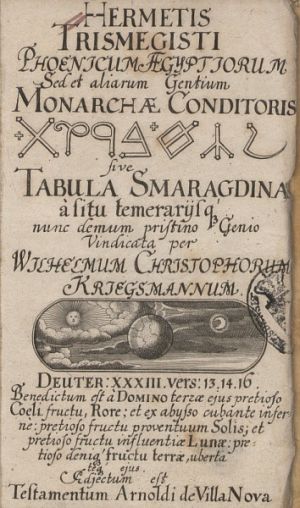Hermetics
The word hermetics refers to a secret revelation doctrine written before 300 BC.
The name is derived from the legendary figure of Hermes Trismegistus, a syncretistic fusion of the greece god Hermes and the Egyptian god Thot, who also wrote the so-called hermetic writings and was seen as the father of Alchemy.
Hermeticism has nowadays become synonymous with spiritual alchemy and occult-esoteric teachings, even to parts of mysticism. It influenced the natural sciences of the world until the 17th century and also shaped occidental occultism.
Well-known writings of the philosophical-theological Hermetica are :
- Corpus Hermeticum, a collection of [2] hermetic treatises
- Asclepius-Dialog, which was handed down together with the works of Apuleius of Madauros ( Coptic fragments thereof were also found in the Nag Hammadi Library, Nag Hammadi Codices VI,8
- Tabula Smaragdina, which had a great influence on alchemy
- ' Excerpts "of Stobaius from the 5th century, compiled for his son Septimius, among them a few comprehensive quotations and passages from hermetic writings
- Die Nag-Hammadi-Library, handed over hermetic texts (VI,6, VI,7a, VI,7b, VI,8 - book VI,8 b includes part of the Asklepius dialog [3]
- Some quotes and fragments handed down by the Church Fathers Tertullian, Lactantius, Clement of Alexandria, and Augustine of Hippo
- The Hermetic definitions, which are handed down in an Armenian translation of the 6th century.
Small fragments of hermetic writings are also found in papyrus funds.
Examples of writings of so-called practice-oriented hermetics are:
- Book about the 36 deans, an astrological text presumably dating from the first century
- The Centiloquium Hermetis, a very popular astrological aphorist collection, of which over 80 manuscripts as well as several prints from the period between 1484 and 1533 are preserved, or
- The Kyranids, a medical-astrological text
- the Kybalion (1908 Chicago)
- The modern books of Franz Bardon
== Literature ==
== Weblinks ==
of Spirituality
universal-path.org
